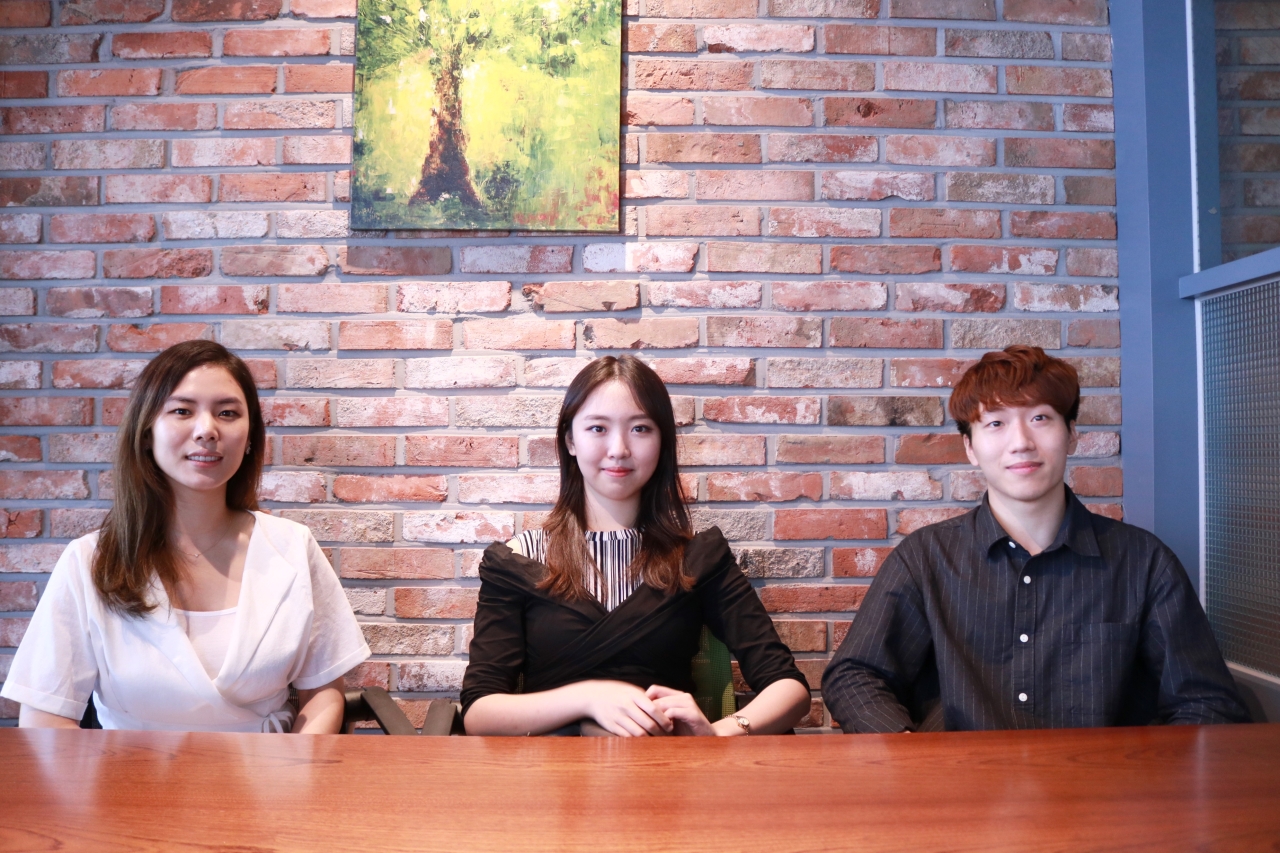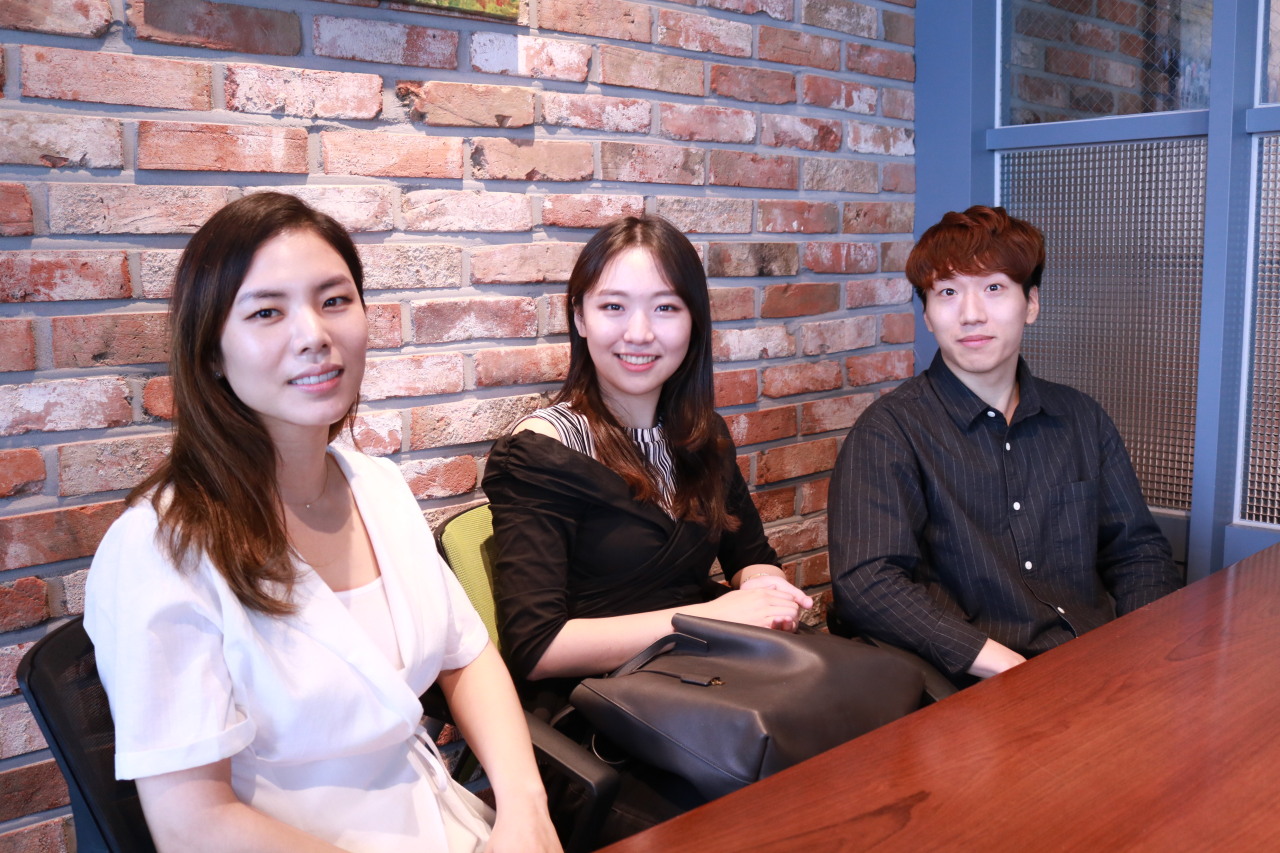From a student’s perspective, tech-savvy South Korea might be just the place to make a promising start as an entrepreneur.
But it also has its limits, despite the unprecedented level of support and attention being paid to the startup ecosystem here, according to Korean students who took part in a two-day hackathon in Finland in June, jointly organized by the Seoul-based Korea Startup Forum and Helsinki-based Junction.
Three of them sat down with The Korea Herald to talk about what’s happening in the startup community.
 |
From left: Seo Hyun-sun, a student in the K-School program at KAIST; Kim So-young, an undergraduate of Yonsei University; and Chang Joon-hyuk, a student at UCLA (Son Ji-hyoung/The Korea Herald) |
Kim So-young, 22, was part of a team at the hackathon called HyvaCC, which came in second for developing an innovative gamification method of getting people to pick up trash. Chang Joon-hyuk, 23, invented an app called Arles, which tracks the symptoms of depression with a “smart mirror.” Seo Hyun-sun, 31, won the top prize with Jubilee, a team dedicated to location-based health monitoring and tracking solution for senior citizens.
Below are some excerpts from the interview.
The Korea Herald: Please introduce yourself.
Seo: I’m a graduate student in the Master of Entrepreneurship & Innovation program at KAIST, and I spent over a decade studying and working overseas. I’m leading two projects -- Jubilee and a personalized beauty platform called Candid. I have an undergraduate degree in Biomedical Engineering from Johns Hopkins University. After graduating from college and interning at Siemens Healthcare, I came back to Korea to build a career as an entrepreneur.
Kim: I have a bachelor’s degree in mechanical engineering, clothing and textiles from Yonsei University. In college, I joined a club for startup entrepreneurs. Then I went to study textile engineering in Germany. I am now interested in how textile engineering can be applied to wearable devices.
Chang: I’m a former UI/UX designer and product manager. Arles is an idea I have much affection for, but we decided to put it on hold. Currently, I am leading the team behind Travelous, a real-time, location-based meetup app for travelers.
KH: What was your impression of Finland as a startup powerhouse?
Seo: I found that Korea and Finland have a lot in common. For instance, both the countries are dedicated to providing financial support and networking channels for young entrepreneurs.
Kim: I was amazed by the size of the exhibition run by students in Finland. Also, I learned about how community builders like Slush, Junction and Startup Sauna were influencing the world.
Chang: I was not aware of a startup boom in Finland until I got there. Even in remote areas, people recognized me as a participant in a startup event. I haven’t seen this much interest in the startup community.
KH: Could you share any advice you got from your mentors at the hackathon?
Seo: Our mentor told us that open communication is crucial, because no one can be good at everything. I was told that as a leader, it’s important for me to identify the strength of each individual team member and designate adequate roles to them.
Kim: Our team was divided, so our mentor suggested ways to incorporate our ideas through candid discussions or a vote. He also said teamwork comes before ideation.
Chang: Our mentors helped us realize what we were missing out in the idealization process and solidify our business model.
 |
From left: Seo Hyun-sun, a student in the K-School program at KAIST; Kim So-young, an undergraduate of Yonsei University; and Chang Joon-hyuk, a student at UCLA (Son Ji-hyoung/The Korea Herald) |
KH: How is Korea in terms of incubating young entrepreneurs? Kim: As an engineering major, I met and worked with many people who wanted to create their own tech startups. But the thing is, there are still risks involved for engineer-only startups, despite the seamless technology. I think engineers tend to take branding, sales and marketing efforts lightly. On campus, I was given a lot of proposals for patent applications and opportunities to meet mentors. On the other hand, I had little chance to learn what I should be mindful of when commercializing technology and building teamwork.
Chang: There are classes in Korea run by consultants on how to craft, revise and execute plans for launching new products. These classes help minimize risks for entrepreneurs.
KH: What are the ideal qualities of an entrepreneur?
Seo: Flexibility. I learned that an early-stage entrepreneur should learn how to take criticism in a positive way. Lean approach helps the entrepreneur grow, and their business too.
Kim: Knowing who can be a good partner in your business. Unless you are in a one-off project, finding a good partner is the most crucial part, especially finding one with a “good” personality.
Chang: Versatility. Being a jack-of-all-trades will help make the entrepreneur a better asset to the team.
KH: How do you evaluate Korea’s support for student entrepreneurs?
Seo: Korea has a well-established network for tech-powered startups. But success does not come easy unless you put yourself out there.
Kim: Universities in Korea have a great tech base and students perform very well. Still, I doubt that they encourage entrepreneurship, in terms of administrative and financial support. It’s time for universities to turn themselves into beacons of opportunity for aspiring entrepreneurs, when they get lost and do not know where to go.
Chang: There are a number of support programs, especially for Korean university students, that serve as sandboxes for early stage entrepreneurs.
By Son Ji-hyoung
(
consnow@heraldcorp.com)





![[Today’s K-pop] Blackpink’s Jennie, Lisa invited to Coachella as solo acts](http://res.heraldm.com/phpwas/restmb_idxmake.php?idx=644&simg=/content/image/2024/11/21/20241121050099_0.jpg)



